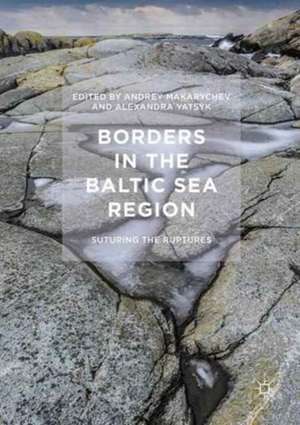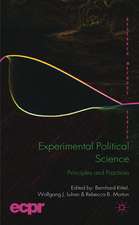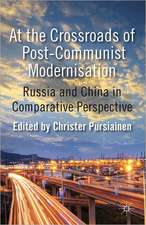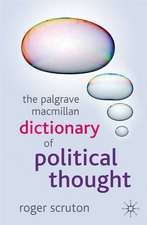Borders in the Baltic Sea Region: Suturing the Ruptures
Editat de Andrey Makarychev, Alexandra Yatsyken Limba Engleză Hardback – 21 noi 2016
| Toate formatele și edițiile | Preț | Express |
|---|---|---|
| Paperback (1) | 524.88 lei 6-8 săpt. | |
| Palgrave Macmillan UK – 23 iun 2018 | 524.88 lei 6-8 săpt. | |
| Hardback (1) | 698.80 lei 6-8 săpt. | |
| Palgrave Macmillan UK – 21 noi 2016 | 698.80 lei 6-8 săpt. |
Preț: 698.80 lei
Preț vechi: 822.12 lei
-15% Nou
Puncte Express: 1048
Preț estimativ în valută:
133.71€ • 139.98$ • 110.64£
133.71€ • 139.98$ • 110.64£
Carte tipărită la comandă
Livrare economică 05-19 aprilie
Preluare comenzi: 021 569.72.76
Specificații
ISBN-13: 9781352000139
ISBN-10: 135200013X
Pagini: 284
Ilustrații: XIII, 271 p. 4 illus.
Dimensiuni: 148 x 210 x 21 mm
Greutate: 0.47 kg
Ediția:1st ed. 2017
Editura: Palgrave Macmillan UK
Colecția Palgrave Macmillan
Locul publicării:London, United Kingdom
ISBN-10: 135200013X
Pagini: 284
Ilustrații: XIII, 271 p. 4 illus.
Dimensiuni: 148 x 210 x 21 mm
Greutate: 0.47 kg
Ediția:1st ed. 2017
Editura: Palgrave Macmillan UK
Colecția Palgrave Macmillan
Locul publicării:London, United Kingdom
Cuprins
Chapter 1: Practising Baltic security at the overlap of the European and the post-Soviet societies of states.- Chapter 2: The Baltic Sea Region: From a hinge between Russia and the West to a rhizomatic information channel.- Chapter 3: Security Dynamics in the Baltic Sea Region before and after the Ukraine Crisis.- Chapter 4: Regional cooperation with an uncooperative hegemon: the case of the Baltic Sea Region.- Chapter 5: When Left and Right Is a Matter of Identity: Overlapping political dimensions in Estonia and Latvia.- Chapter 6: Russian speaking community in Estonia: Legal, political and security analysis.- Chapter 7: Baltic Region and Central Asia: what does it take to make a region? A critical perspective.- Chapter 8: Shaping Estonian: national identity in film, art and singing.- Chapter 9: The “Russian World” and the Securitization of Identity Boundaries in Latvia.- Chapter 10: (Re)-Drawing Borders: Russia and the Baltic states.
Notă biografică
Dr. Andrey Makarychev is Professor of Government and Politics at the University of Tartu, Estonia. His areas of expertise are political discourses, norms and identities as seen from different domestic and international perspectives. His record of previous institutional affiliations includes George Mason University (Fairfax, VA), Centre for Conflict Studies (ETH, Zurich), Danish Institute of International Studies (DIIS), and Nizhny Novgorod Linguistic University.
Dr. Alexandra Yatsyk is Visiting Researcher at the Uppsala Centre for Russian and Eurasian Studies, Sweden. She is also Director of the Centre for Cultural Studies of Post-Socialism and Associate Professor of the Journalism Department at Kazan Federal University, Russia. She has served and held research at the Institute for European, Russian and Eurasian Studies (GWU, USA), Centre for EU-Russia relations (University of Tartu, Estonia), School of Language, Translation and Literature Studies (University of Tampere, Finland), and Centre for Urban History for East Central Europe (Lviv, Ukraine).
Dr. Alexandra Yatsyk is Visiting Researcher at the Uppsala Centre for Russian and Eurasian Studies, Sweden. She is also Director of the Centre for Cultural Studies of Post-Socialism and Associate Professor of the Journalism Department at Kazan Federal University, Russia. She has served and held research at the Institute for European, Russian and Eurasian Studies (GWU, USA), Centre for EU-Russia relations (University of Tartu, Estonia), School of Language, Translation and Literature Studies (University of Tampere, Finland), and Centre for Urban History for East Central Europe (Lviv, Ukraine).
Textul de pe ultima copertă
This book focuses on the recent political trajectories within the Baltic Sea Region from one of the success stories of regionalism in Europe to a potential area of military confrontation between Russia and NATO. The authors closely examine the following issues: new security challenges for the region stemming from Russia’s staunch anti-EU and anti-NATO polices, institutions and practices of multi-level governance in the region, and different cultural strategies that regional actors employ. The common threads of this innovative volume are issues of changing borders and boundaries in the region, and logics of inclusion and exclusion that shape its political contours. From diverse disciplinary and methodological positions the authors explain policies of specific Baltic Sea states, as well as structural matters that make them a region.
Caracteristici
Offer multidisciplinary insights into the Baltic Sea region Analyses the most recent developments in the aftermath of the Ukraine crisis Provides critical assessments of earlier optimistic interpretations of Russia's role in the region, and problematize Russia's role as both insider and outsider










